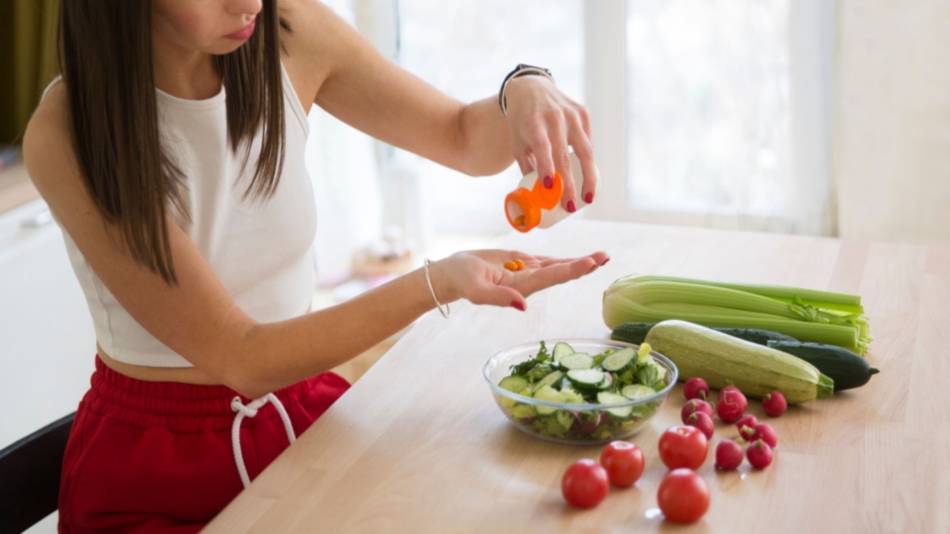
Answer:
Some vitamins and nutrients are found in abundant quantities in meat, poultry and fish but not in plant-based foods (unless they have been "fortified," i.e., nutrients have been added). For this reason, vegetarian or vegan diets may not meet all the daily nutrient requirements, and supplements may be necessary. This may occur with vitamins B-12 and D, iron, zinc, calcium, iodine, long-chain omega-3 fatty acids and, possibly, protein.
Below are strategies for meeting daily nutrient requirements through dietary modifications or supplementation, and ways to find supplements that don't contain ingredients objectionable to people following vegetarian or vegan diets.
If you would like to get most of these nutrients from a single, vegan, supplement, see our Top Pick General Multivitamin for Vegans in our Multivitamin Supplements Review.
Vitamin B-12
Vitamin B-12 is found most abundantly in meats, poultry and fish. Cereals, milks, yogurts, and nutritional yeast that are fortified with B-12 may provide sufficient B-12 for vegetarians, but unfortified, plant-based foods are generally not good sources. Note that fermented soy (e.g., miso, tempeh), shiitake mushrooms, algae, and unfortified nutritional yeast are not considered reliable sources of B-12 (Plotnikoff, Nutrients 2023). However, nori, a type of seaweed, may help improve vitamin B-12 status among vegetarians, although there are concerns related to differences in levels of B-12 in nori samples, as well potentially excessive levels of iodine and heavy metals.
Consequently, people who are strict vegetarians or vegans may need to supplement with vitamin B-12. A 3-month study among vegans and vegetarians with marginal B-12 deficiency showed that supplementing with 50 mcg of sublingual B-12 daily or 2,000 mcg weekly could restore adequate B-12 levels. Among strict vegans, stopping supplementation can result in significant declines in blood levels of B-12 within 8 to 16 weeks (Storz, Nutrition 2024).
Keep in mind that B-12 will get absorbed just as well as from an oral tablet as sublingual tablets, and sublingual tablets and other specialty forms often contain sugar substitutes that can cause gas, bloating or diarrhea. See our Top Pick among B-12 supplements, as well as a suitable option for people wanting to avoid the cyanocobalamin form of B-12, although there is little scientific rationale for this concern (Plotnikoff, Nutrients 2023).
Iron
Most people are able to meet their daily nutrient requirement for iron by eating foods such as meat, poultry, and fish, as well as dried fruits, grains, and green leafy vegetables. However, since iron from plant sources is absorbed half as well as that from animal sources, strict vegetarians or vegans may need to consume almost twice as much iron from their foods, as other people, and this may be hard to get from foods alone. Cooking foods — especially acidic foods — in cookware made of iron, as opposed to other materials, can contribute some iron to the diet. However, a review of clinical studies evaluating use of iron cookware for increasing hemoglobin levels reported mixed evidence, with only about half of studies showing a significant benefit of iron cookware on hemoglobin levels, suggesting that iron cookware should not be used in place of dietary changes or iron supplementation to prevent or treat iron deficiency (Sharma, Nepal J Epidemiol 2021).
If you need to supplement with iron to meet your daily nutrient requirements, see our Top Pick among iron supplements.
Be aware that iron supplementation can cause constipation, nausea, diarrhea, stomach erosions and ulcers, so it is a good idea to have your hemoglobin and ferritin levels checked by your doctor before starting an iron supplement.
Zinc
Compounds called phytates occur in legumes and grains and can interfere with zinc absorption. Consequently, vegetarians and vegans may require as much as 50% more of the RDA for zinc than non-vegetarians. The RDA of zinc for adults is 11 mg for men and 8 mg for most women (women who are pregnant or breastfeeding need more), so men and women following a vegetarian or vegan diet may need closer to 17 mg and 12 mg daily, respectively, if obtained exclusively from food.
Fortunately, following a well-planned vegetarian or vegan diet that includes good food sources of zinc and includes steps to reduce phytate intake should be sufficient to meet zinc requirements. Foods that are rich in zinc include soy, nuts, seeds and fortified cereals (Saunders, Med J Aust 2013). Although legumes, which are an important source of zinc, also contain phytates, some steps can be taken to reduce phytates in these foods. For instance, soaking legumes before cooking can help reduce the amount of phytate in these foods. Canned beans have been found to have phytate levels 70% to 90% lower than found in dried beans. However, be aware that soaking rice and other grains can lower phytate levels but also reduce levels of zinc by up to 30% (Lestienne, Food Chem 2005). Interestingly, laboratory evidence suggests that the availability of zinc from grains such as rice, and pulses such a chickpeas, may be increased when consumed with garlic or onion (Gautam, J Agric Food Chem 2010).
If you do need to take zinc supplements long-term to meet your daily nutrient requirements, it is generally considered advisable to also take copper at a dose of 1 to 3 mg daily, as excessive intake of zinc can interfere with the absorption of copper, leading to copper deficiency. See our Zinc Review for zinc supplements Approved by ConsumerLab that are suitable for vegans and vegetarians.
Calcium
While calcium can be obtained from various vegetarian- and vegan-friendly foods, including soybeans, white beans and tofu, some research has found that vegan diets are associated with inadequate calcium intake (Clarys, Nutrients 2014). Another study found that middle-aged and older women (but not men) who followed a vegan diet and did not take supplemental calcium and vitamin D had three times the risk of hip fracture compared to non-vegetarians.
Consequently, for vegans (or vegetarians) whose dietary intake of calcium is not adequate (RDA of calcium for adults is 1,000 mg daily for women up to 50 and men up to 70, and 1,200 mg daily for older men and women), it might be a good idea to supplement with a moderate amount of calcium — but no more than 300 to 500 mg per serving. See our Top Picks for calcium supplements, which include some that are vegan-friendly.
Vitamin D
While adequate vitamin D can be often be obtained simply through adequate sun exposure, factors such as skin pigmentation, clothing coverage and sunscreen use, age, and location (latitude) of an individual can affect the extent of skin production of vitamin D. Some research has found that following a vegan or vegetarian diet that does not include vitamin D supplements or fortified foods is associated with low vitamin D intake and low blood levels of vitamin D (Craig, J Am Diet Assoc 2009). Consequently, vitamin D supplements may be necessary for some individuals.
Vitamin D can be found in dietary supplements in the D2 or D3 form. Either form can be obtained inexpensively, and both can raise blood levels of vitamin D, although some, but not all, research suggests that vitamin D3 may be more effective. The D2 form may also cause erroneously low vitamin D blood test results. For these reasons, if you need to take a vitamin D supplement, it seems prudent to use the D3 form.
Be aware that vitamin D3 in supplements is often synthesized from lanolin (an animal source) and sold in capsules made from gelatin (also from animals), and thus may not be suitable for vegans. However, some vitamin D3 supplements contain D3 from lichen, which is vegan-friendly although it may be more expensive. You can find such a product in our Vitamin D Supplements Review.
Omega-3 fatty acids
The only type of omega-3 fatty acid that is considered essential is ALA (alpha-linolenic acid), and vegans and vegetarians tend to get sufficient amounts, as it is found in seed oils, such as flaxseed oil.
Although not considered essential, two other omega-3 fatty acids, eicosapentaenoic acid (EPA) and docosahexaenoic acid (DHA), are generally obtained from oils from marine sources, such as fish, krill, and algae. These may have benefits due to their anti-inflammatory properties. Vegetarians tend to consume limited amounts of EPA (<5 mg daily) and DHA if eggs are excluded from the diet (Davis, Am J Clin Nutr 2003). See our Top Pick for getting omega-3s from algal oil.
For more details about forms of omega-3 fatty acids for vegans and vegetarians, see our CL Answer about vegan-friendly sources of EPA and DHA.
Iodine
Iodine is necessary for proper functioning of the thyroid gland, which regulates metabolism in our bodies, and is also necessary for normal brain development in children during pregnancy and infancy. Fish and other seafoods, as well as dairy foods, are good sources of iodine, but be aware that almond, soy, oat, and other plant-based milks provide very little iodine.
Seaweeds, such as kelp, and iodized salt are also good sources, but be aware that if you are using kelp as a source of iodine, one absorbs only about half as much iodine from kelp as from an iodine supplement containing potassium iodide. Also, note that most specialty salts are not iodized.
See the amounts of iodine we found in kelp and other seaweed products — but also note the amounts of toxic heavy metals we found.
Protein
Vegetarians and vegans (including those who are athletes) can meet protein requirements with plant proteins. However, vegetarian diets often contain less protein than non-vegetarian diets. Also, vegetarian diets that are mainly limited to just one protein source may require greater protein intake to meet essential amino acid needs, as some plant-based proteins contain low amounts of one or two essential amino acids (for instance, rice and wheat protein have low lysine content) (Craig, J Am Diet Assoc 2009; Marsh, Med J Aust 2013). For people following such diets, adding a complementary plant protein that contains higher amounts of the amino acids in question may be beneficial. This may be done, for example, by combining a grain-based protein, like rice, with a legume-based protein, like pea protein. Keep in mind that "strict protein combining" in which different plant-based proteins are eaten at each meal is not considered to be necessary, as long as a variety of plant proteins are eaten each day (Marsh, Med J Aust 2013). Research has shown that soy and pea protein, or a combination of soy, rice and pea protein, can be beneficial for maintaining or building muscle mass.
Although textured soy products, such as tofu, and protein supplements are processed foods, a preliminary study in Brazil among 558 vegan adults (mostly female) suggested that those who incorporated such products into their diets were less likely to be at risk of inadequate protein intake than those who did not consume such products. The study, however, was based only on a 1-day dietary survey (Leitao, JAMA Netw Open 2024).
Be aware that tofu may contain a small amount of cadmium (see our article about heavy metals for details). Also see our Protein Supplements Review for our Top Picks among protein supplements, including those suitable for vegans and vegetarians. Also see our article about protein supplements for vegans. Be aware that branched-chain amino acid supplements provide some of the essential amino acids that the body needs, but won't provide all of them.
Other Nutrients to Consider
Riboflavin (vitamin B-2) is obtained from milk, meat, poultry, and fish. It can also be obtained from nuts such as almonds, dark leafy green vegetables, and “enriched” breads, grains and cereals that have been fortified with riboflavin. Although extremely rare, vegans and vegetarians are at greater risk of riboflavin deficiency compared to those who consume meat and dairy. This is particularly true for women taking hormonal birth control (which may interfere with riboflavin absorption), and those who are pregnant or lactating (who have increased requirements for riboflavin). Infants whose mothers are deficient during pregnancy can also experience adverse effects.
Unfortunately, it is difficult to find a riboflavin supplement that provides only the recommended daily amount, as most provide 1000% or more of the Daily Value, so getting adequate amounts from natural and fortified food sources may remain the best option for vegans and vegetarians without a deficiency. In addition, some multivitamins can provide reasonable, moderate doses of riboflavin. See our Top Picks among multivitamins and prenatal vitamins. For those who are deficient or require high-dose riboflavin, see our Top Pick riboflavin supplement.
Taurine is an amino acid important to high energy tissue, such as the brain, retina, and muscles. Our bodies can make taurine from other nutrients, so there is no dietary requirement for taurine, although it can also be obtained directly from meat, poultry, eggs, dairy products, and fish. Seaweeds, such as nori, contain very small amounts of taurine, but it is unlikely that a person would consume enough seaweed to provide the amounts obtained from a typical omnivorous diet (Terriente-Palacios, Food Chem 2022). Low levels of taurine in the body occasionally occur when diets do not provide enough of the building blocks for making taurine, or taurine itself, as can sometimes occur in vegetarians — although it is not known if this is clinically significant. See our Taurine Supplements Review for our list of approved taurine supplements, which includes an Approved product that is suitable for vegetarians and vegans.
Selenium deficiency is rare in the U.S. but more common in the U.K. and other parts of Northern and Central Europe, where the soil is depleted of selenium, resulting in lower amounts in plant-based foods. In these countries, meat and dairy products are the main source of this mineral (Gibbs, Dietetics 2024). See our Selenium Supplements Review for more information, our tests of products, and our Top Pick among selenium supplements. (Brazil nuts can also be a good source of selenium, with one nut providing the recommended daily intake for selenium.)
Join today to unlock all member benefits including full access to all CL Answers and over 1,400 reviews.
Join NowAlready a member? Sign In Here.
Join now at www.consumerlab.com/join/

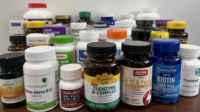
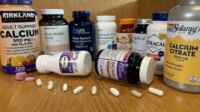

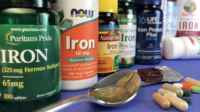
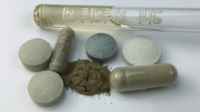
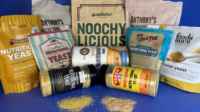
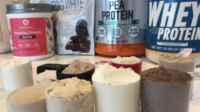
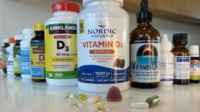
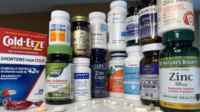
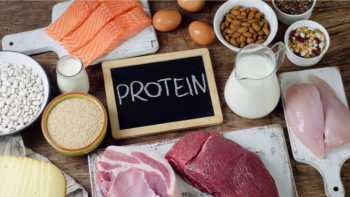





john21513
December 30, 2024I also saw a paper on how creatine supplementation yields greater benefits for vegetarians/vegans than carnivores
Reply to this post…
Truth Science
December 16, 2024Is there a physiologic reason why someone's iron level would become lower, since Iron does not get excreted or metabolized out of the body? (Excepting through bleeding). I do not have a personal experience but have wondered about the need for this supplement in multivitamins.
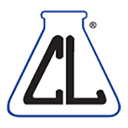 ConsumerLab.com
ConsumerLab.com
April 02, 2025Potential causes of iron deficiency are discussed in the following section of our Iron Supplements Review: https://www.consumerlab.com/reviews/iron-supplements-review/iron/#aspirin-anemia
Reply to this post…
Lisa20704
September 24, 2024As someone else has said, it's refreshing to see content for the WFPB vegan diet.
I value ConsumerLab.com very very much and have now several years of subscribing with NO regrets. It's so worth paying for quality, unbiased information in our strange and inauthentic world (that includes "science."
Keep this good stuff coming our way, CL! Mil gracias!!!
 ConsumerLab.com
ConsumerLab.com
September 25, 2024Thank you for your kind words, we're glad you found it helpful!
Reply to this post…
AJ
September 24, 2024Choline is another nutrient that vegetarians and vegans may have difficulty getting sufficient intake of. And though we make some choline ourselves, most women after menopause can not make enough to fulfill our bodies' needs.
Reply to this post…
Yesenia17360
October 25, 2023Is there a multi vitamin for vegans? I can't seem to find one. Please help! Thank you so much.
 ConsumerLab.com
ConsumerLab.com
November 08, 2023Please see our Multivitamin and Multimineral Supplements Review for information about our Top Pick general daily multi for vegans: https://www.consumerlab.com/reviews/multivitamin-review-comparisons/multivitamins/#toppicks-general
Greg18909
March 05, 2024Although more expensive, I like Complement multi vitamin (vegan).
M19277
April 13, 2024VegLife's Vegan One multivitamin costs about $10 per bottle. I've been using it for a little while, and it's fine. My hub uses Complement, but the Algal oil they use has a fish taste and smell -- unlike Ovega, which I prefer, for Omega3s.
Reply to this post…
Kevin17358
August 16, 2023Happy long time subscriber here thank you. As parent of a son diagnosed with Crohn’s disease at 7 who became very healthy and muscular teen totally in remission for years on a whole food vegan diet, I researched Iron and it appears iron supplements increase bad gut bacteria. His doctor recommended cooking in a cast iron pan vs supplements. Any recent info on this would be most appreciated. We use all the other supplements you recommend here for vegans.
 ConsumerLab.com
ConsumerLab.com
September 08, 2023We've added information about getting iron from iron cookware in the following section of our article: https://www.consumerlab.com/answers/eight-supplements-for-vegetarians-and-vegans/vegetarians-and-vegans/#iron-cookware
Reply to this post…
GAY17356
July 23, 2023I want to know what iron supplements are derived from animals
 ConsumerLab.com
ConsumerLab.com
August 14, 2023The majority of iron supplements are not animal based. However, products containing Proferrin heme-iron polypeptide (HIP), contain polypeptides derived from bovine sources. For more information about this form of iron, see https://www.consumerlab.com/reviews/iron-supplements-review/iron/#misc.
Reply to this post…
Julieanne17352
April 21, 2023Thank you. I rely on your excellent reports. I thought you also wrote something about vegan collagen booters but I cannot find it now. Would you please post this?
 ConsumerLab.com
ConsumerLab.com
April 24, 2023Thank you for your kind words, Julie. Plants do not produce collagen, and therefore there is no "vegan collagen." However, as discussed in our Collagen Supplements Review, there are some supplements that contain certain vitamins, amino acids, and other ingredients used in building collagen (see https://www.consumerlab.com/reviews/collagen-supplements-review-peptides-hydrolysate/collagen/#collagen-boosters.)
Reply to this post…
JFloaz
March 25, 2023As a 20-year vegetarian and 15-year vegan, for most of that time, I've enjoy wonderful health benefits but I did not take a B12 supplement. A very dumb mistake. By the time I started, I had 60 symptoms of B12 deficiency. Thankfully supplementation cured all symptoms but it was a serious wake-up call. Please take your B12 - critical. I love living a plant-based life!
Doreen19147
March 31, 2024What was your main symptoms of B-12 deficiency and what did you do to correct it? Also which supplement of B-12 brand do you take now?
 ConsumerLab.com
ConsumerLab.com
April 01, 2024See our B Vitamins Supplements Review to learn about symptoms of B-12 deficiency https://www.consumerlab.com/reviews/review-best-b-vitamins-and-complexes-energy-b6-b12-biotin-niacin-folic-acid/bvitamins/#constipation.
Jeanne20748
October 01, 2024I had B-12 deficiency which caused by homocysteine to rise putting me at rish for heart attack or stroke. I also had SEVERE brain fog. I could barely function. I had to get intravenous B-12 to gain my mind. Homocysteine levels are almost back to normal now. Vegans need B-12.
Reply to this post…
Linda17350
March 24, 2023I took Taurine in powder form for about two months. I developed the most horrific gas imaginable, and pain in my bowels. Even dropping it to 1/16th of a tsp. I'll never ever use taurine again.
Reply to this post…
Rebecca17349
March 24, 2023ConsumerLab.com continues to impress. As a whole foods plant-based vegan with autoimmune disease, your guidance is invaluable. Thank you.
Reply to this post…
Stan17347
February 22, 2023Thank you to CosumerLab -- for responding to the concerns of those readers whose diet is primarily from plant-based sources, and whose nutrient intake and needs may differ from the “norm” in crucial ways
 ConsumerLab.com
ConsumerLab.com
February 23, 2023Thank you for your kind words, Stan. We are glad to hear you are finding ConsumerLab to be helpful!
Reply to this post…
M17345
October 31, 2022The standard of care for vegans includes regular B12 testing (e.g., as part of annual lab work). Many non-vegan doctors do not know this. Most long-term vegans I know who don't supplement are surprised by a low test result eventually -- it takes a few years to use up B12 stores, and once they're gone, the number drops if you aren't supplementing.
Reply to this post…
Diana17341
September 16, 2022Thank you. I had discovered that when I take the supplement Lysine, I don't get mouth blisters (cold sores) any more but I stop this supplement then they come back. Good to know and that I need to watch the type of protein I eat when vegan.
Reply to this post…
Hanna17340
September 16, 2022Thank you for this. Very helpful.
Reply to this post…
Fran17339
September 16, 2022Very helpful! Thank you!
Reply to this post…
Thea17338
September 07, 2022Glad to see this section on ConsumerLab. Thank you.
Reply to this post…